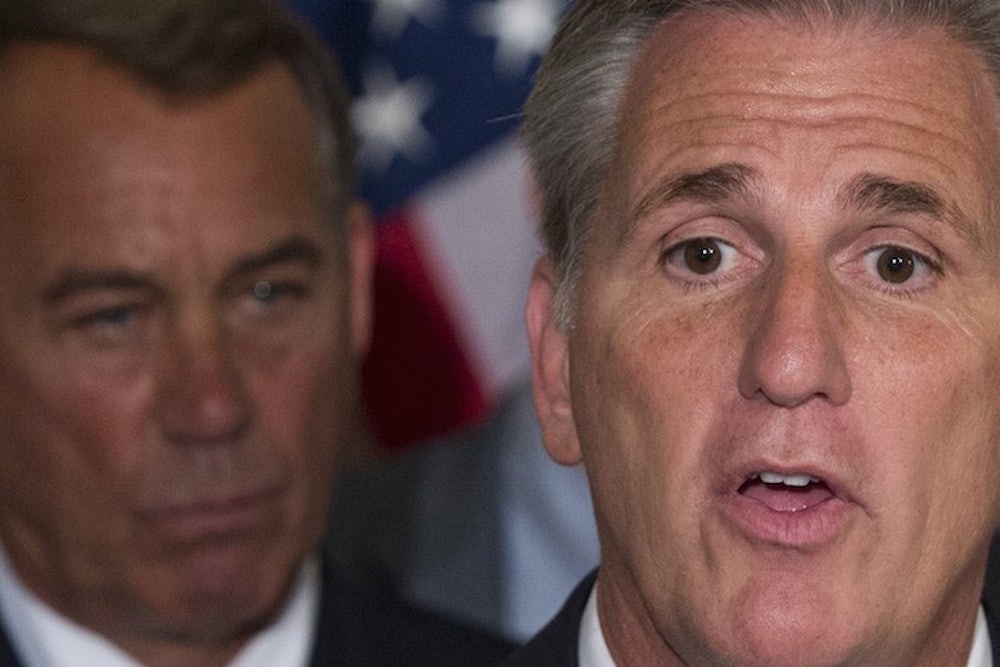Ask most Republicans about Benghazi and they’ll pay lip service to the September 11, 2012 attacks in Libya that killed four Americans. But in an an unprompted defense of his party’s record in Congress, House Majority Leader Kevin McCarthy—the odds-on favorite to replace John Boehner as speaker when he retires at the end of October—admitted what everybody knows, but no Republican is supposed to say out loud: that the GOP’s Benghazi fixation has always been designed to damage Hillary Clinton.
"Everybody thought Hillary Clinton was unbeatable, right?" McCarthy pleaded to Sean Hannity on Fox News on Tuesday night. "But we put together a Benghazi special committee, a select committee. What are her numbers today? Her numbers are dropping. Why? Because she's untrustable. But no one would have known any of that had happened, had we not fought."
The political world reacted as if McCarthy had accidentally handed Democrats a gift. But it wasn’t a gaffe; it was a talking point. Earlier the same day, McCarthy made a nearly identical boast about the Benghazi committee’s political effectiveness to CNN’s Jake Tapper.
“[I]t’s not just a policy," he said. "It's also a media. And people have to join that. So, that's why, within a select committee—think of this. When you look at poll numbers of Hillary Clinton, they have dropped. Unfavorables pretty high, because people say they don't trust her. They don't trust her because of what they found out about the server and everything else. Would you ever have found that out had you not gathered the information from the Benghazi Select Committee?”
Democrats were elated to hear McCarthy admit the obvious so candidly, and most of them seem to believe that McCarthy is a Boehner clone, who comes with an entertaining side of unthinking goofiness as a bonus. But viewed in a wider context, it’s easier to interpret McCarthy’s remarks as a promise to restive conservatives that he’ll be a more ruthless and distasteful political operator—and more solicitous of the reactionary right—than his predecessor. McCarthy’s shoring up support in a way that should give Boehner second thoughts about his decision to resign.
“I’ll make this pledge to you,” McCarthy told Hannity. “If I’m fortunate enough to become speaker, the next three months are very difficult, it’s a short amount of time to put a strategy, and we have unbelievable things in front of us. But I’ll come on every single month if you want, or more, and you hold me accountable.”
Boehner, to his great credit, didn’t feed the media beast that sought to destroy him. McCarthy, before serving a single day in the speakership, handed his gonads over to the most Limbaugh-like personality on Fox News, who happily placed them in escrow.
Hannity isn’t after McCarthy—who isn’t a particularly quotable guest—for ratings alone. He wants regular progress reports on a different promise McCarthy made to him.
Actually, it was four promises: “Defunding Planned Parenthood, defunding executive amnesty and immigration, defunding Obamacare, and this Iranian deal is an unmitigated disaster that will lead to a modern day Holocaust,” Hannity said, rattling off his top priorities. “Will you tell conservative America tonight that you will fight to the end … to defund those issues and use the power of the purse?”
“Yes, the answer is yes,” McCarthy said.
Hannity surely misunderstands a lot of things, but he isn’t confused about the tools available to Republicans in Congress. Planned Parenthood’s federal reimbursements, like the money that finances Affordable Care Act subsidies, can’t be turned off without new legislation that the president agrees to sign. President Barack Obama’s temporarily stymied deportation relief policies are similarly self-financed under current law. The nuclear agreement with Iran isn’t a new expenditure or a policy that entails novel administrative costs. When Hannity says he wants these initiatives “defunded” through the “power of the purse,” he’s asking McCarthy to attach amendments to annual government spending bills or the debt limit and to give Obama and the Senate a choice between enacting them or turning government operations and the economy into collateral damage.
In 2011, this tactic nearly hurtled the economy into a recession. In 2013 it resulted in a government shutdown that lasted nearly three weeks. McCarthy’s promising to give it another shot.
On Sunday, Boehner suggested he’s inclined to settle some of these accounts before he steps down. “I don't want to leave my successor a dirty barn,” he said on CBS' Face the Nation. “I want to clean the barn up a little bit before the next person gets there.”
But funding for the government will lapse in early December. Senator John Cornyn of Texas, a member of the Republican leadership, told Roll Call that the idea of increasing the debt limit before Boehner’s last day is “probably overly ambitious.” If he’s right—if Boehner declines, or is unable, to beat these deadlines in the next month—the outgoing speaker will be handing over these responsibilities to an untested successor who’s already making promises to conservatives he can’t keep.
